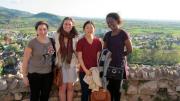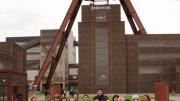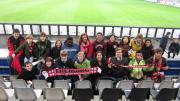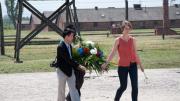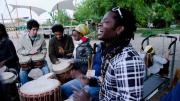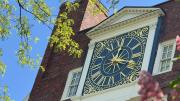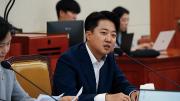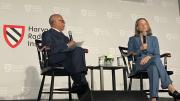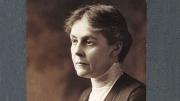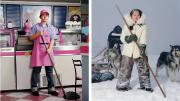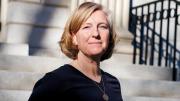Julie Yen ’14 wasn’t keen on skipping a semester’s worth of classes at Harvard to study abroad. Turns out, she didn’t need to.
Yen was one of 20 undergraduates in the inaugural class of the Harvard College Europe Program (HCEP), the first semester-long and faculty-led study abroad program in Harvard’s history, according to Bell professor of history Sven Beckert, the program’s academic director.
From January to July, students enrolled in courses at the universities of Strasbourg (France), Basel (Switzerland), and Freiburg (Germany) and took specially designed seminars on European history, politics, and environmental issues. They interned at the European Parliament, the drug company Novartis, and even a local farm near Freiburg, among other places. The program, Beckert notes, was organized specifically to bring students without a prior interest in Europe, or a prior knowledge of Europe or European languages (other than English), to the continent. All travel was funded by David Howe ’64.
“Throughout the six-month program, students were tasked with exploring one broad issue: Europe’s answers to the problems of the modern world,” says Beckert. “The program speaks to interest in the internationalization of the University, and it is historic in the sense that never before in Harvard’s history has the University organized a semester-long study abroad program directed by a faculty member.”
Yen’s professor may have been from Harvard, but Europe was her classroom. During her six-month stint, the history concentrator chatted with Polish rabbis and priests, discussed the French headscarf ban with a female Muslim sociologist in Istanbul, and played West African drums while watching the sun set in Germany—all with classmates she now considers best friends. “The drumming turned into an impromptu dance lesson on a beach,” Yen recalls. “None of us could stop laughing for a long time, we had so much fun.”
Debanjan Pain ’13, a government concentrator, took the master’s-level class “International Relations: Globalization and Regionalization” at the University of Freiburg, as well as an ecology class “Geography, Natural Systems, and Environmental Problems in Europe,” where he learned about ecology and sustainability in an extremely environmentally conscious city that borders the Black Forest and the Rhine Valley. In his spare time, he ran the Freiburg half-marathon with other HCEPers, and soaked in Bastille Day fireworks from the Eiffel Tower in Paris.
Neurobiology concentrator Rose Nyameke ’14 thought HCEP would be a good way to experience college life “outside the Harvard bubble.” She was not disappointed. “It was wonderful to see remnants of the Berlin Wall, and listen to a man talk about his experience with building a tunnel to get people from one side to the other,” she says. Other moments that stand out include her internship at Roche, the pharmaceutical company, in Basel, and “the dinners [HCEP participants had] together as a family, because that's what we became: one big, diverse family.”
The program was split into two sessions, Academic Program 1 (January to April in Freiburg) which consisted of a three-week orientation program, specially organized HCEP seminars (one taught by Beckert and two taught by local faculty members under his supervision), 140 hours of intensive language study in either French or German, and two week-long group excursions—one to Istanbul and one to Berlin, Warsaw, and Krakow. Academic Program 2 (April to July) had the students split up into three groups in either Freiburg, Basel, or Strasbourg, where they took courses at local universities and participated in a three-month internship.
All undergraduates could apply to the program, but Beckert says criteria for acceptance were diverse and included “motivation for study abroad, ability to live abroad, and match between what the program could provide and student interest.” “I wanted to bring students from all parts of the University,” he explains. “As a result, we do have a fair number of science students—who usually do not study abroad.”
Although much of HCEP was academic in nature, students said there was an emotional side to the program also, pointing out their group trip to the Auschwitz concentration camp in particular. Yen recalls the “complete silence” as the group walked out of the camp and the dust “blew up” in their faces. Nyameke calls it an “important day” because “the memories of the victims will forever live through our remembrance of what we saw.”
Beckert says he was extremely impressed with students’ enthusiasm throughout the entire session, and expects the program to continue on a yearly basis—five faculty colleagues have already expressed an interest in directing it in future years—although it will have to go through a formal approval process by the full Faculty of Arts and Sciences this fall.
Yen hopes more students will have a similar opportunity to “take Harvard with them” when they study abroad. “Not only were these six incredible months of cultural immersion, learning, travel, and forming close friendships—but this time away from Harvard has helped me learn what is important to me, what my academic interests are, and how I want to spend my time,” she says. “I know that I will be better prepared to tackle—and get the most out of—Harvard for having left.”
